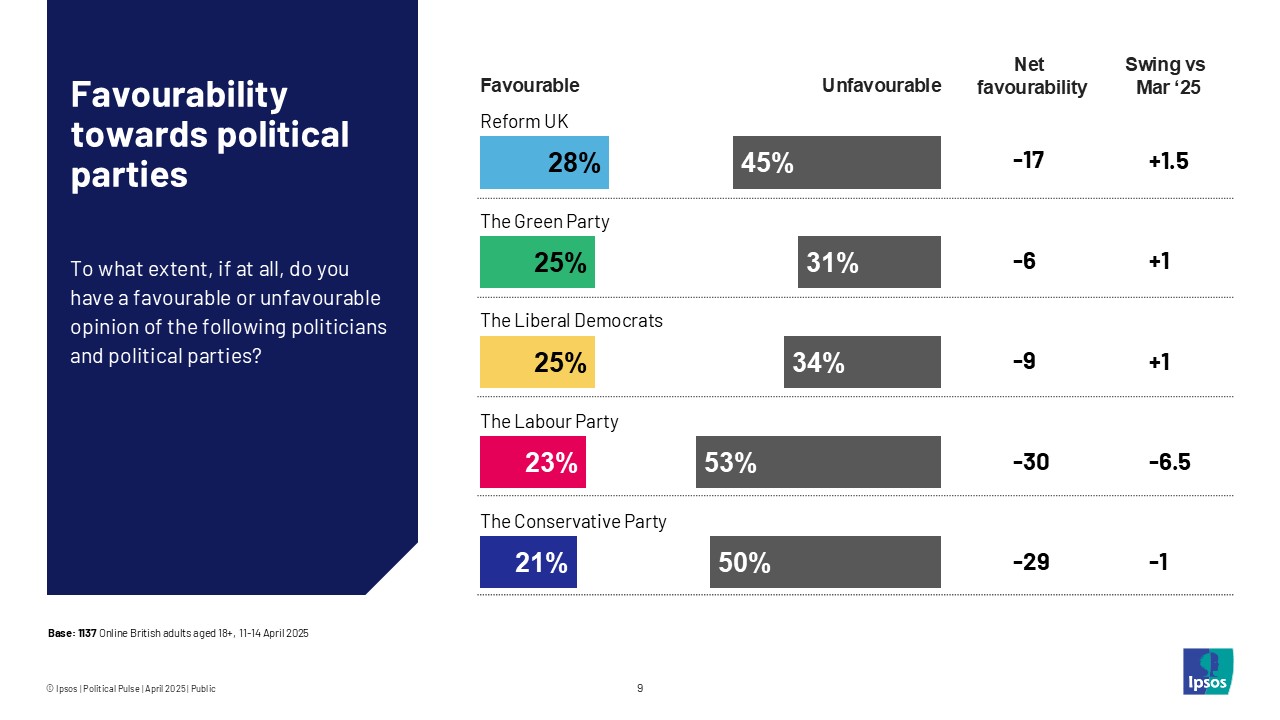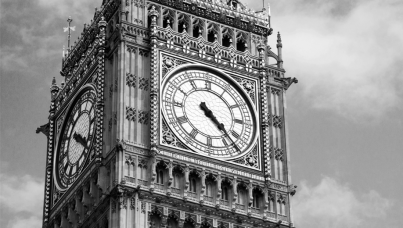Favourability ratings for Starmer, Reeves and Labour all unwind this month
The latest edition of the Ipsos Political Pulse survey, taken between the 11th and 14th of April, looks at public opinion towards several key political figures and parties, and the state of the country.
Favourability ratings of Starmer, Reeves and Labour all unwind after last month’s improvement

- 23% of Britons have a favourable view of Prime Minister Keir Starmer, down from 29% last month. Just over half (52%, +6ppts) are unfavourable, giving him a net approval rating of -29. In March, after the Oval Office meeting, his net rating was -17, up from -34 in February, but this month’s rating loses much of that improvement.
- 29% hold a favourable opinion of Reform UK leader Nigel Farage. 47% are unfavourable, giving him a net favourability rating of -18, similar to last month.
- Leader of the opposition Kemi Badenoch holds a rating of -25, with 20% favourable and 45% unfavourable, also similar to last month.
- Around a quarter (24%) hold a favourable view of Liberal Democrat leader Ed Davey, while 30% are unfavourable (though 35% are neutral and 11% don’t know), giving him an unchanged net favourable score at -6.
- Just 15% of Britons hold a favourable view of Chancellor Rachel Reeves. 55% are unfavourable, giving her a net favourability rating of -40, down from -33 last month. This matches the lowest figure that Ipsos has recorded for her since November 2023 and is worse than her predecessor Jeremy Hunt recorded between October 2022 and April 2024 (his lowest score was -31).
Favourability towards political parties

- The Labour Party has also seen a dip in approval ratings over the past month. 23% are favourable towards the party of government, down from 29% in March. Just over half (53%, up from 46% last month) are unfavourable, giving a net favourability rating of -30. This unfavourable rating is back to levels seen in February (-28) and is also similar to ratings recorded in November 2019 at the start of that general election campaign (-29).
- Around two in ten (21%) express a favourable view of the Conservative party, with 50% unfavourable (net -29, similar to last month).
- The Green Party’s net ratings are also unchanged at -6, with a quarter (25%) favourable towards the party, while 31% are unfavourable.
- The Liberal Democrats sit at -9. A quarter (25%) express a favourable view and 34% unfavourable.
- Reform UK has a net rating of -17 (a marginal improvement from -20 last month). 28% hold a favourable view of the party, with 45% unfavourable.
Government performance
- 59% say the country is heading in the wrong direction, and just 19% say right. This is a net negative rating of -40, down from -32 last month (though compared with -47 in February).
- When asked to score the government’s performance on a scale of 0-10, the mean score overall is 3.8 (down slightly from 4.0 in February). The government scores highest among younger Britons aged 18-34 (5.4) and 2024 Labour voters (5.6), while those aged 55+ (3.1) and 2024 Reform UK (1.8) and Conservative (2.8) voters score it lowest.
Gideon Skinner, Senior Director of UK Politics at Ipsos said:
Our latest Political Pulse suggests widespread lack of enthusiasm towards political leaders and parties ahead of May’s local elections, but with particular warning signs for both Labour and the Conservatives. The Conservatives and their leader Kemi Badenoch still struggle to achieve a step change in their public favourability ratings, which have been low for some time. Labour, meanwhile, have lost much of the short-term improvement we saw last month after Keir Starmer’s performance on the world stage, with negativity towards the Prime Minister, Chancellor and their party all moving back above the 50% mark. This likely reflects returning concerns over the state of the country and domestic issues such as the economy, with Rachel Reeves favourability ratings worse than we recorded even for her Conservative predecessor Jeremy Hunt.
Technical note:
- Ipsos interviewed a representative sample of 1,137 adults aged 18+ across Great Britain. Interviews were conducted online between the 11th-14th April 2025.
- Data are weighted to match the profile of the population. All polls are subject to a wide range of potential sources of error.


